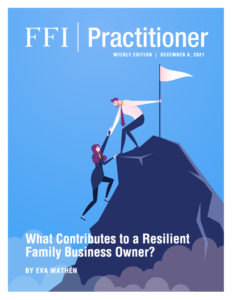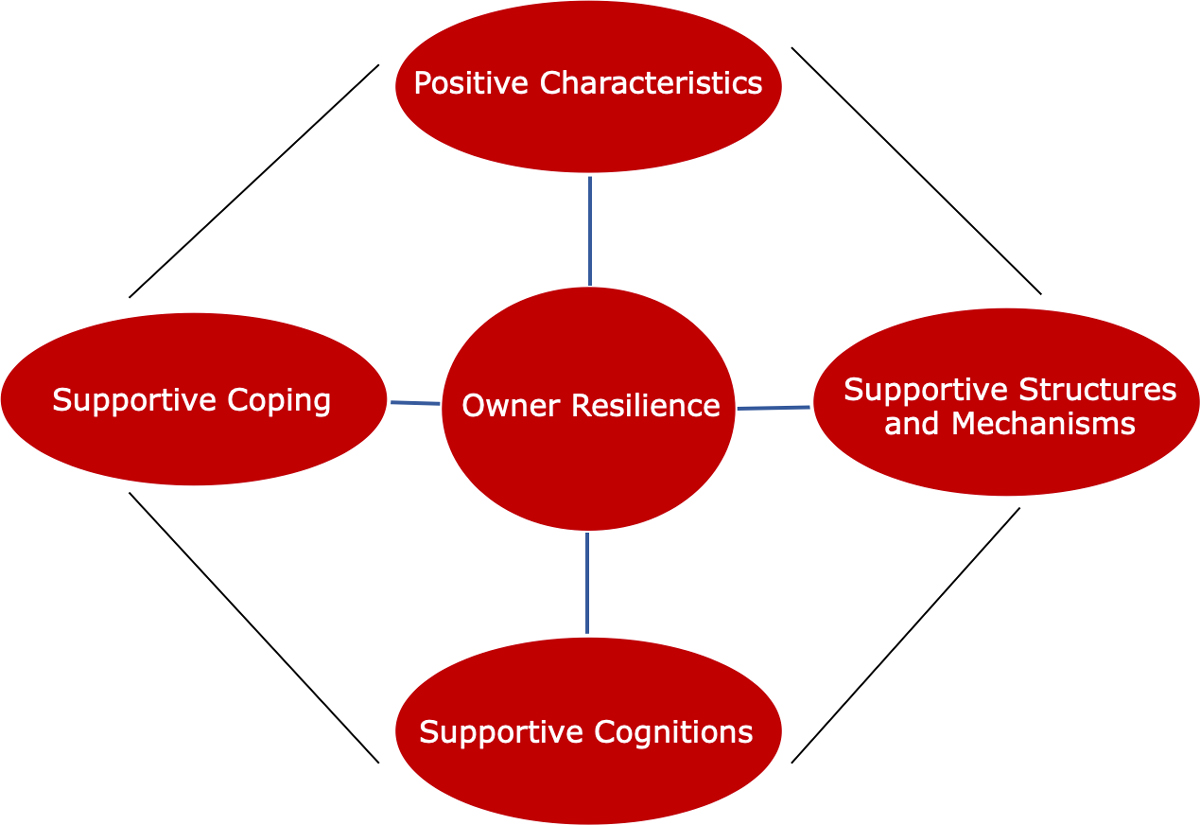
View this edition in our enhanced digital edition format with supporting visual insight and information.
Thank you to this week’s contributor, Eva Wathén, for her article examining factors that contribute to family business owners’ resilience. In the article, she summarizes results of a study that she recently conducted and shares practical advice for advisors to use with their clients.
“Resilience” has become a buzzword in the past couple of years due to the COVID-19 pandemic and the challenges it has caused economically, psychologically, and socially.
There are numerous studies suggesting that family firms are well-equipped to withstand unplanned disruptions. Their long-term thinking, emphasis on continuity and sustainability, and care for community provide important tools to thrive in the face of challenges.
However, behind every family firm is a group of individuals representing the ownership of the entity. Interestingly, fewer studies have focused on individual owners’ resilience, despite the pivotal role of owners in firm resilience. For instance, the study by Conz et al. (2020) claimed that individual resilience is most applicable to family business continuity, but studies of individuals have largely concentrated on entrepreneurial resilience—predominantly in first-generation family businesses—and employee resilience.
This research gap caught my attention as I was contemplating an MSc Applied Psychology dissertation topic. In addition, my work as a family business coach and consultant prompted me to regularly ask the question, “What does it take to keep a family business owner resilient so that the family and business as entities can continue to thrive?”
In addition, I wanted to gain an understanding of attributes that might affect owners’ resilience and their potential for growth in adversity. I approached the attributes using the VIA classification of character strengths (Peterson & Seligman, 2004) to gain insights into participants’ top five signature strengths.
I combined this information on top strengths with the outcome of eight qualitative interviews with Finnish family business owners, representing second generations and beyond, from many industries. Five were from SME-size businesses and three were from larger corporations. Gender division was equal.
I also used thematic analysis to derive themes contributing to participants’ individual resilience and gathered relevant theories from the fields of family resilient SMEs (Branicki et al., 2018), and owner resilience (Cooper et al., 2013) to frame these emerging themes.
According to the findings of my research, key resilience determinants could be grouped as below:

Positive Characteristics
The Positive Characteristics highlighted the strengths of honesty, curiosity, fairness, and kindness, which is hardly surprising when thinking of the traditional long-standing family firms’ core values.
Moreover, in times of adversity, big-picture thinking, long-term commitment and perseverance, authenticity, and speed of action were common values expressed by the participants. It was apparent that, as the owners got older, more reflection benefitted owner resilience. According to my research, hastiness and spontaneity seemed to be virtues of earlier career phases, but they did not support the most resilient actions.
Supportive Structures and Mechanisms
Supportive Structures and Mechanisms refer to the importance of clear governance and defined owner roles, an established owner strategy, outside expertise and support, a competent board, and cultivated networks. These structures appeared, according to the research, to provide a safeguard for many situations in the future.
Supportive Cognitions
Supportive Cognitions suggested a solution-focused attitude combined with an entrepreneurial and growth mindset, i.e., thinking realistically and positively but without excessive optimism. The most striking finding of my research was related to this key resilience determinant. What appeared to support the continuity of the firms represented was the notion of values as pillars in decision-making, accountability, and continuity. These values were referenced in the interviews by all participants in various ways, as were practical applications. My analysis further revealed that well-defined values were the greatest differentiating factor between entrepreneurial resilience (first generation) and owner resilience (second and later generations), reinforcing the importance of values as bearers of family business continuity.
Supportive Coping Skills
Finally, Supportive Coping Skills highlighted actions that promoted resilience. The participants commonly used a variety of experts to broaden their understanding of a given situation. Facts were gathered from multiple perspectives enabling a variety of scenarios to be developed.
The eight Finnish family business owners interviewed all reported leading by example, practicing respectful communication, and addressing conflicts in a constructive manner. However, what seemed to matter most for resilient behavior was the supportive relationships that owners developed over a lifetime. Healthy and supportive vertical (adult-child) relationships appear to provide the greatest benefit in times of adversity. Insufficient childhood support could be supplemented by one-to-one support from a spouse, friend, mentor, or coach later in life. Thus, one-to-one relationships, in one form or another, seemed invaluable for participants’ personal resiliency.
In a recent edition of FFI Practitioner, Dean Fowler presented a Four-Circle Model of family businesses. I believe Dean’s model further highlights how individuals can promote or undermine the continuity and resilience of family firms.
The findings of this study provide practical applications to family enterprise advisory work. First, the study reinforces the idea that a lack of well-defined values represents a significant risk to family business continuity. Conversely, aligned values that are purposeful and supportive to individual owners can enhance their resilience. Therefore, advisors should pay increased attention to the values expressed by family enterprise clients and consider whether these values hinder or support the resilience of key individuals and the firm at large.
Secondly, another factor that boosts resilience in a family enterprise is the one-to-one relationships that provide support to individual owners when significant challenges arise. Whether these relationships are developed in early childhood or later in one’s career is of less importance. What seems to matter most is that owners have someone who can help them navigate challenging times. A supportive role that advisors can assume to increase their client’s resilience is to serve as a trusted coach or sparring partner, as these relationships can provide valuable support during times of sudden challenges.
References
Branicki, L.J., Sullivan-Taylor, B., & Livschitz, S.R. (2018). How Entrepreneurial Resilience Generates Resilient SMEs. International Journal of Entrepreneurial Behavior & Research, 24(7). 1244–1263. https://doi.org/10.1108/IJEBR-11-2016-0396
Conz, E., Lamb, P.W., & De Massis, A. (2020). Practicing Resilience in Family Firms: An investigation through phenomenography. Journal of Family Business Strategy, 11(2). https://doi.org/10.1016/j.jfbs.2020.100355
Cooper, C.L., Flint-Taylor, J., & Pearn, M. (2013). Building Resilience for Success. Palgrave Macmillan.
Peterson, C. & Seligman, M.E.P. (2004). Character Strengths and Virtues: A handbook and classification. Oxford University Press.
Walsh, F. (2016). Applying a Family Resilience Framework in Training, Practice, and Research: Mastering the art of the possible. Family Process, 55(4). 616–632. https://doi.org/10.1111/famp.12260
About the Contributor

Eva Wathén, ACFBA and CFWA, is cofounder of Bravemotion Oy in Finland. Bravemotion Oy’s services for family businesses include facilitating owner strategies, communication, and trainings for family businesses, as well as coaching key players in multiple generations of family firms. Eva is a third-generation family business owner, having served in several different roles. She has more than 25 years of experience working in or with family businesses. She can be reached at eva.wathen@bravemotion.com.

View this edition in our enhanced digital edition format with supporting visual insight and information.





